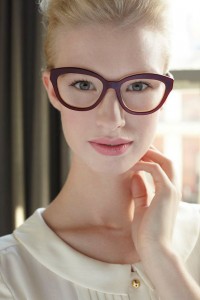Does it Matter if I Get Thicker Lenses for my Glasses?
Having thick lenses as a result of a strong prescription is not damaging to your vision.
Are Thicker Lenses for My Glasses Really That Bad?
 There’s no reason to assume that a thick lens, if properly crafted to match your prescription, will in any way degrade your vision more than a thinner lens. The lens is transparent; your eye does not have work any harder to see through a thick lens than it does a thinner one.
There’s no reason to assume that a thick lens, if properly crafted to match your prescription, will in any way degrade your vision more than a thinner lens. The lens is transparent; your eye does not have work any harder to see through a thick lens than it does a thinner one.
What thinner lenses can do, however, is improve your appearance and self confidence is a number of ways. While thick lenses are not at all harmful to your vision, they do involve several aesthetic concerns that affect your eye-wear. Here are a few of the common areas of complaint regarding thick lenses:
- Thick lenses protrude beyond your frames
- Lens thickness may dictate your frame style
- Thick lenses may distort the appearance of your eyes and face
- Thick lenses can add a lot of weight to your eye-wear frame
- Strong myopia prescriptions can lead to exceptionally thick lens edges
The physical size of a very thick lens is a primary visual drawback. Thick lenses tend to protrude beyond the frame in which they are mounted, adding depth and goggle-like appearance to your glasses. This is especially noticeable from the sides, where the gap between your eyeglass frames and your eyes is the greatest. Protruding lenses draw attention away from the frame and also require frequent cleaning to remove dust and dirt build-up.
The width of your lenses may also directly affect your frame style. Thin wire, rimless, or semi-rimless frames may not support the additional weight and bulk of a thick lens, thereby limiting the style, material, and/or colors you have available to you when selection your frame.
Strong to very strong prescriptions also tend to create lenses so thick that they distort your face as viewed by others. Your eyes, eyebrows, and cheekbones can appear out of proportion with the areas of your face that are not covered by the lenses. Depending on the type of prescription, this distortion can take the form of magnification, which exaggerates your features, or reverse-magnification, which makes them appear unusually small.
Some consumers also suffer from the actual weight imparted by thicker lenses. Very thick lenses can be exceptionally heavy, especially those made of glass; they may also require mounting in thicker, heavier frames. When worn for long periods of time the weight of such eye-wear leads to slippage and discomfort, and leaves impressions on the skin.
Finally, lenses designed to adjust for myopia, or nearsightedness, feature a sloping curve. For very strong prescriptions this results in lens edges that are exceptionally thick.
If any of these factors affect you and your eye-wear, you might want to consider switching to high index lenses. The reduction in weight and especially thickness may free you from some or all of consequences of thick lenses.



Leave a Reply
You must be logged in to post a comment.